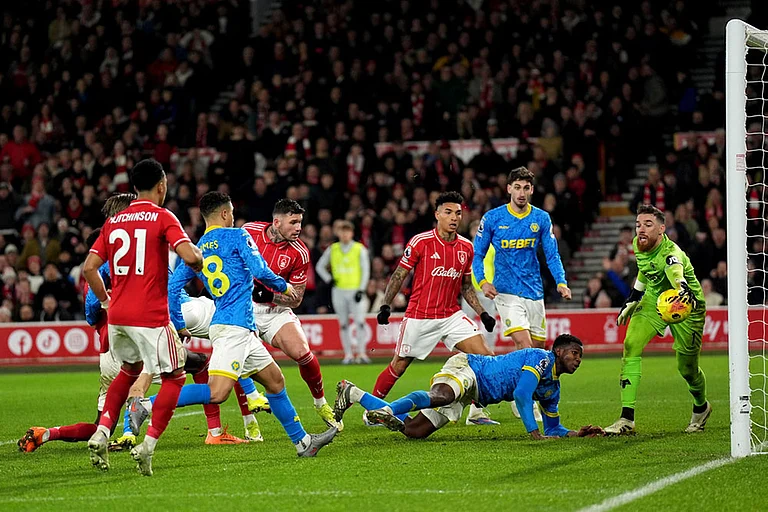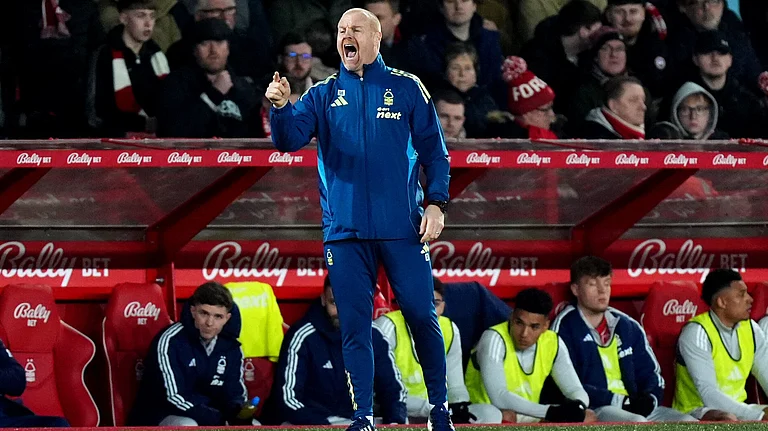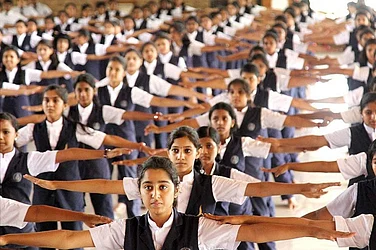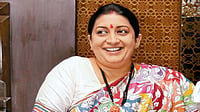Amit Shah is spending 110 days on the road, in a cross-country trip meant to strengthen and expand his party’s base. On a stopover in Delhi, the BJP president takes time out for Outlook, for an interaction touching upon major themes relating to India’s domestic politics and foreign policy. Excerpts from an interview with Bhavna Vij-Aurora:
The US has declared Hizbul Mujahideen chief Syed Salahuddin a global terrorist. Do you think it is a big moral victory for India?
We have been saying the same thing for a long time. America has realised it a little late—hence this declaration now. India’s stand has become much stronger at the international level and Pakistan’s problems will only increase from here on. In declaring Salahuddin a global terrorist, the US has certified that PoK is being used to launch terrorists in India. It’s a big achievement.
Video: Tribhuvan Tiwari; Editing: Suraj Wadhwa
Do you think now India can have talks with Pakistan from a position of strength?
Our stand is very firm. They must first create an atmosphere for talks. Bomb ke dhamake ke beech mein baat-cheet sunai nahi degi. (The bombs drown out all conversation.) We can talk only once the blasts and the violence stop.
On another front, are you worried about China’s statement, reminding India about “lessons of history”?
This is not the first time…such statements have come several times before. In the normal ebb and flow of international relations, everyone knows why such statements are made and also how they need to be assessed.
You’re going to complete three years as BJP chief. It has been one of the most successful stints for any party president. Are we seeing the emergence of a new BJP?
Success does not depend upon the party president alone! Many things are linked to it. Our state governments, the government at the Centre…their work has contributed greatly to this success of the party that you see. Then there are crores of party workers who take the good work of the government to the people. It’s my good fortune that I am heading the party at this juncture.
How much credit would you give to Modiji’s charisma and how much to your strategies for the party’s successful run?
You cannot separate the two. It’s a package deal.
You have chosen Ram Nath Kovind, a Dalit, as your presidential candidate. What’s the political message here? Is it about identity politics? Is it tactics…especially knowing that, in UP, a majority of Dalits voted BSP?
Kovindji has been chosen as the presidential candidate based on his capabilities. That he comes from the Dalit community does have a special significance. The BJP believes it is everyone’s responsibility to work for the upliftment of society’s backward and oppressed sections. When Modiji was chosen leader by party MPs, he said in his speech that the government will be for the poor, the oppressed, farmers, women and all deprived sections of society, including Dalits and tribals. And that it will work for their upliftment.
Will Kovind’s candidature have an impact on the Gujarat elections since he belongs to the Koli community that comprises over 20 per cent of the state’s population?
The point is, whoever we selected, it would have had a similar relation to some segment of the society or another. In the same way, Kovindji’s candidature too can have an impact on certain social segments.
You are venturing way beyond your core constituency, beyond your bases in north India—take Assam. What next for the party?
We are expanding in the entire country, but that doesn’t mean we once belonged to a defined area, a ‘home base’. The BJP is an all-India party, and has been so right from the time it was established. It’s a different issue that our organisation had managed to strengthen its base only in some states. Even electoral success was limited to a few states. That’s what is changing now. You only mention Assam. But in Manipur, our voteshare went up from 2 per cent to 36 per cent. I believe it’s a big achievement that the BJP formed a government there. Our party got the maximum voteshare. In Assam, we have a government with full majority. In UP, we were in a very bad state for 20 years, and our voteshare rose by more than 25 per cent. In Uttarakhand, whenever we formed a government, it used to be a borderline victory…we also lost at times. But this time we got a massive victory with a three-fourth mandate. Beyond that, in West Bengal, our voteshare has nearly doubled. In Kerala, our voteshare has increased by three times. In Orissa’s local elections, our voteshare increased considerably and we have become the number two party.
The BJP’s position is getting better in the entire country. The organisation is growing stronger, and we are getting electoral success too.
What about the violence in Darjeeling? Isn’t the BJP in a dilemma since you had promised Gorkhaland?
Our dilemma is a secondary thing. The priority is that the state government should restore peace there.

In the past three years as party president, what have been your biggest achievements?
More than mine, it should be credited as the achievement of the Narendra Modi government. He has changed the scale of thinking among India’s people. Three years ago, people were concerned about the direction in which the country was heading. I say without any doubt that today there are no such concerns anymore. People know the country is heading to join the ranks of the top countries of the world. And it’s going to happen soon. People now realise things can happen in India too. Earlier, nobody could even imagine that there wouldn’t be a single village without electricity, not a single house without a toilet and not a home without an LPG cylinder. Nobody thought, despite having abundant talent and merit among scientists, that India could become number one in space technology. That, despite having such a brave, disciplined military with a technical edge, we could carry out surgical strikes. It was only befitting that we did something for the brave jawaans. Their demand for One Rank One Pay (OROP), pending for the past 40 years, was fulfilled by the Modi government in one stroke.
What about demonetisation? Do you consider it a success?
Of course. A lot of money that was out of the system has come in because of demonetisation. In less than one year, 92 lakh new PAN cards have been made. Income-tax registration has increased. Direct and indirect taxes have witnessed an increase of 19 per cent for the first time. All this shows how successful notebandi was in the fight against black money and corruption.
Benami property, shell companies and black money were quietly accepted as part of the system, and nobody thought anyone could fight the rotten system. We framed rules and brought in a law against benami property and now action has started being taken. We have started a huge campaign against shell companies…. We can say we have taken big strides towards destroying this system.
Are you happy with the way GST has been implemented? Many states had issues with it.
Yes, many state governments had their own issues, but we tried to take everyone along. Some states are consumer states, some are manufacturing ones and some are neither or both. There are hilly states and those with a huge tribal population. Despite having so much divergence, we succeeded in implementing GST with everyone’s consent. The dream of one tax one nation has been realised.

What is the government doing about the farm crisis? For decades, the middleman system has carried on. The farmers do not get their due, whether it’s a glut or scarcity.
I agree with you only partially. I think the farmers’ situation has improved. In Maharashtra, the agricultural growth rate was minus eight per cent when we came to power there. There has been an increase of 20 per cent there! In Madhya Pradesh, agriculture has been growing at an average rate of 14 per cent annually in the last five years. Countrywide, from a negative two per cent, the agricultural growth rate has now become four per cent; an increase of six per cent has been achieved.
Yes, we did inherit serious issues—what they call legacy issues—which we are trying to overcome. In UP, for example, concrete steps have been taken to establish dairy farming. Maharashtra has launched a campaign for water conservation. In Gujarat, a similar campaign has been very successful. Efforts are on to get all mandis online so that farmers can get proper rates. Loan availability for farmers has been made easier after the BJP government came to power at the Centre.
Also, the PM crop insurance scheme has been introduced, which provides cover to the farmers from any natural calamity, right from sowing to the threshing floor—for the first time since Independence. It’s a complete insurance scheme that has been brought by the Modi government.
By means of the Soil Health card, the research that was lying in the laboratories is being brought to the land. Now soil samples are tested and analysed—which crop should be sown in which soil for best yield, how much compost is needed and of what kind. All this information is being made available to the farmer. From among nine crore farmers, two crore farmers have got Soil Health cards in the last three years.
It’s a fact that the situation is still not satisfactory but challenges are being tackled very well and we have achieved considerable success.
Agriculture or industry, that seems to be a dilemma for the Modi government.…
Not at all. Till now, governments were caught in a dilemma whether they should focus on developing industry or agriculture. Now all agree that both can develop simultaneously. Not just this, the Modi government has ended many such contradictions. Both big and small industries are being developed. It’s also clear that there’s no contradiction in focusing on villages and cities at once. Till now, governments could not decide whether to give priority to reforms or to work as a welfare state. Now everyone agrees that both can coexist.
What is your target for the future?
When I took over as party president, I said the BJP will be strengthened in seven states where it does not have much presence and in the Northeast. These include Kerala, Tamil Nadu, Andhra Pradesh, Telangana, Orissa, Bengal, Assam and other states in the region, including Tripura. We have achieved considerable success in this. We have also got electoral success in these states, including in Tripura where we are almost number two. We are number two in Orissa too. We have made gains in Kerala and Bengal. We have formed governments in Assam, Manipur and Arunachal. Our organisation is becoming stronger in Telangana also. The BJP’s ideology and organisation is reaching those places where it did not exist earlier. Our workers are doing their job well.
You say the BJP’s footprint will expand to the entire country, but each part has a different social and cultural milieu. The beef ban is becoming an issue in some states. Your Meghalaya party chief resigned on the issue....
In this country, resignations can happen over many issues. What can one do about it? On the latest notification, it’s a Supreme Court order. There is no ban on beef. It’s only a question of transportation.

But what about cow vigilantism and the recent incidents of lynching?
These incidents should not be given a communal colour. All these are law and order incidents. You show me one incident in any BJP-run state where action has not been taken in such cases. I condemn all such incidents, I’m not justifying it. And without wishing to underplay these recent incidents of lynching, I want to point out that it used to happen under UPA rule also. The same with communal violence. In 2012 and 2013 too, incidents were reported that were casteist and communal in nature. Dalits were raped every day then too. Why didn’t anyone protest then? Why didn’t they return awards earlier? Why only after 2014?
Lynching is lynching. Whoever does it, whoever may be the victim, whether it’s in Srinagar or any other place.... What about lynching in Kerala? West Bengal? No one raises a voice. Why don’t you ask Mamata didi or the Communists about the lynchings in their states? Why is only the BJP questioned? Remember…we are not running away from it, it’s our responsibility. In states with BJP governments, it is being properly tackled. There is not even a single incident in which appropriate steps have not been taken, where the accused has not been arrested and booked under appropriate IPC sections, including 302 (murder).
You have talked about plans for states where the party does not have much presence. What about states where you already have a government? How do you propose to hold on to Gujarat, MP, Chhattisgarh and Rajasthan?
In Gujarat, we will win by a very big margin. Our seats will increase.
Despite anti-incumbency…being in power for so long?
Even in 2012, it had been “so long”! If the governance is good, then long rule is naturally beneficial.
Are you similarly confident about states that go to elections in 2018?
There is still time to go for elections there. But the governments of Madhya Pradesh, Chhattisgarh and Rajasthan have been doing very good work.
What about the Maoist problem in Chhattisgarh?
In Chhattisgarh, nearly 70 per cent of the Maoist-affected area has been freed. Bastar and Sukma are still left and we are fighting a tough fight there too. I’m confident that our security forces will win the fight.
Security forces go from outside without adequate knowledge about local terrain and language….
A huge part of the country has been freed of the Maoist problem. When I was home minister in Gujarat in 2003-04, there used to be a meeting of Maoist-affected areas. The entire red corridor used to be shown as stretching from Pashupatinath to Tirupati. Now, a large part of this has been freed. We should trust our security agencies.
What’s your assessment of your government in Kashmir? There is a demand for talks even there.
We have a clear stand on talks. Till stone-throwing is on, we are not going to talk to anyone. Also, who do we talk to?
Is Nitish Kumar getting closer to the BJP? Any possibility of him dumping ally Laloo Prasad Yadav and joining hands with you?
Nothing is happening on that front. So far Nitishji has extended support to Ram Nath Kovind and we welcome it. There is no need for any further speculation.
Are Bihar and Delhi sore points still, those losses?
Not at all. Our voteshare increased considerably in Bihar despite us losing the elections. In Delhi, it went down only by half a per cent.
Do you think the CBI raid on NDTV was a mistake? All the bad press here and abroad?
We have not done anything based on who will think what, or what people will say. We have only thought about the truth. Every decision will be liked by some, disliked by others. What can we do? Moreover, on the NDTV raids—it was not the government’s decision. It was CBI’s decision.
Can the emerging Opposition unity pose a challenge to NDA in 2019?
If you look at the history since 1955, efforts at forging Opposition unity have always gone on without any success. Whoever is in Opposition makes an effort. I don’t want to comment on whether they will succeed or not, but remember that it’s because of the UPA’s failures on major fronts that the people decided to vote them out in favour of BJP. I believe we have done well in the past three years and will make an effort to do better in the next two. Whoever joins in with the UPA’s taint of failure, they will have to suffer like the SP did.
Is the Congress your biggest strength?
The Congress’s weakness can never be our strength. Our strength has to be our own.
Finally, how do you keep all your decisions such big secrets? Kovind’s candidature was such a surprise.
It happened earlier too. Even the name of the Uttar Pradesh chief minister was a surprise for all of you. It’s a good thing. The party understands there is no point leaking any information.


























